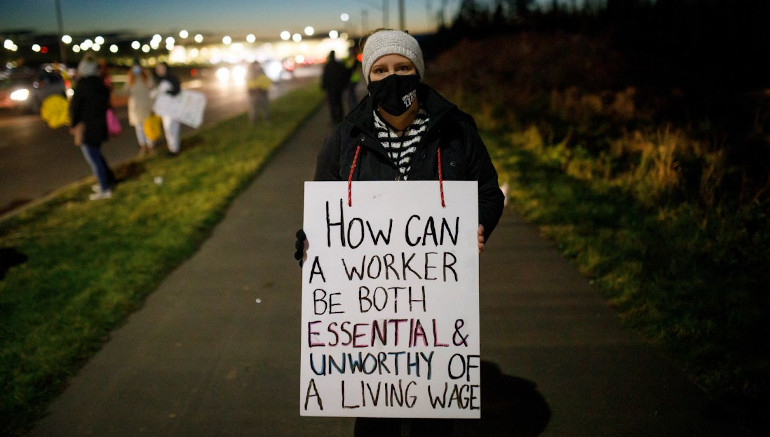New Brunswick’s public sector general strike has come to an end. A majority of CUPE locals voted last week for a contract that will see a 2 percent pay raise each year of the five-year agreement. On top of this, workers will receive a 25 cent per hour wage increase per year.
Crucially, casual workers will see significant wage increases, now receiving 100 percent of the regular rate. While casual workers should arguably be getting a higher wage than full-time workers, due to the lack of job security, in the past CUPE casual workers were often making next to nothing. For instance, a casual cleaning attendant in 2017 was making only $14.03 per hour.
The concessions from the government were only won through the weight of a significant strike, lasting 16 days and involving 22,000 workers. From October 29 until November 15 public sector workers across the province were out. They represented healthcare workers in rehabilitation and therapy, but also many education workers, support staff, community college workers, school bus drivers, custodians, mechanics, and transportation and infrastructure workers.
CUPE is claiming the contract as a victory. They were originally fighting for 3 percent increases for 4 years; the 2 percent increase plus 25 cents per year is being hailed as virtually the same as the original ask.
One local remains in negotiations, however. Eleven CUPE locals were involved in the strike and ten of the locals voted to accept the government’s contract. However, local 1253 (representing school bus drivers, custodians and maintenance staff) voted against the contract over disputes around possible changes to their pension plan.
It is possible the local will be able to resolve the pensions through negotiations. While they have also returned to work, a future strike from this local would have dramatic effects for the NB government. Custodians and bus drivers striking means schools in the province are effectively shut down as there is no ability to either ferry students or clean the schools and reduce the threat of COVID-19.
CUPE president Steve Dross has publicly stated that the CUPE leadership will support local 1253 in their negotiations but when asked whether or not there will be a solidarity strike if 1253 goes out again, he said “we will cross that bridge when we get to it.”
Preparing for Action
The mass strike of eleven locals comes off the back of 15 years of subpar contracts that have seen workers constantly lose out. On top of this NB Premier Blaine Higgs has continuously gone after public sector workers, even pushing a wage freeze on public sector workers at the end of 2020.
Every step of the way Higgs forced workers to conclude that they could expect nothing but contempt from the provincial government. If they wanted to win anything at all they would have no choice but to take collective action.
In 2021 Higgs flat out refused to resolve outstanding contracts. Some workers had been without a contract for two or three years!
On May 28, CUPE issued a 100-day final notice to the government, leading to 22,000 being in a legal strike position on Labour Day. Talks commenced in August but broke down by September after Higgs offered only stingy contracts with a 0.25 percent yearly wage increase tied to concessions.
By September, the 11 CUPE locals conducted a strike vote with an overwhelming 94 percent voting to go out, and while October saw COVID cut across events, by the end of the month workers were on strike.
Higgs immediately went on the attack unleashing a wave of propaganda claiming that the strike was disrupting services in the middle of COVID. Higgs then pushed an emergency order to force striking healthcare workers back to work. Massive fines loomed over the heads of both ordinary workers and the union itself. CUPE was facing a minimum fine of $100,000 for each day a worker refused to return to work and individual union members were threatened with up to $20,400 per day that they remained on strike.
The truth was that New Brunswick’s failing public health system and COVID numbers (routinely the worst in Atlantic Canada) had nothing to do with the strike. The real blame lay squarely at the feet of Higgs and the Tory government. Nevertheless, the propaganda machine was working overdrive.
Alongside the government, hospital CEOs also attempted to blame CUPE strikers for the cancellation of surgeries and medical services being taken away. In reality these services were already stripped back when Higgs placed NB in a state of emergency after dropping the ball on COVID.
CUPE healthcare workers were also extremely careful to ensure crucial services remained in place while strike action was underway. In CUPE Local 1252 for instance, 9,000 work in healthcare and during the strike 70 percent who were deemed essential continued to work.
Public Sector Crisis
While Higgs continued to blame public sector workers for failing services the reality is they have been worked to the bone in New Brunswick. Cuts to services continue year after year, leading to workers having to constantly take more on their plate. Burn out rates are through the roof, there are not enough staff to fill the roles and there are major recruitment problems throughout the public sector.
The biggest slap in the face for these workers though is the fact that public services shouldn’t be failing. The government has continually underfunded services in an attempt to make them fail, and line them up for privatization. Capitalism constantly seeks new avenues for profit. To big business, the healthcare system, basic services at schools and many other of public services are licences to print money, if only they can get their hands on them. Governments pay the costs while private companies reap the profits. As Canada’s private senior homes so clearly demonstrated, the profits come from worse services to the public and attacking the conditions of the workers. Politicians in New Brunswick, both Conservative and Liberal, work hand in hand with families like the Irvings, one of Canada’s richest families that dominates Atlantic Canada, to defund the public sector, set it up for failure and then push the privatization of services.
This is one of the features that made the CUPE strike so crucial to New Brunswick’s future. Public sector workers are always on the front line of attacks to services. If this strike was lost it would have been a green light for big business to go hard after public services in the province.
But if this strike was seen by the leadership and much of the membership as almost defensive, turning the tide on constantly dropping wages and conditions, it should be stated clearly that much more needs to be won.
Public sector workers in New Brunswick have spent years as some of the lowest paid in the country. There are reports of workers taking on a second or third job just to cover rent. People are living pay cheque to pay cheque and even having to rely on foodbanks to feed their families.
Struggles Ahead
Inflation today sits at 4.4 percent. This means that just to keep up with the cost of living, pay raises already need to take inflation into account. The reality is any pay increase lower than 4.4 percent will be a pay cut as workers see their spending power drop. On top of this, provinces like New Brunswick have seen the housing crisis hit their towns and cities hard. Many from the western provinces have moved east in search of an escape from rampant COVID cases in cities like Toronto, Edmonton and Montreal. Developers and investors have played into this by jacking up the rents across Atlantic Canada and carrying out a sea of renovictions.
The CUPE strike represents a change in direction for public sector workers in New Brunswick, but it also sits as part of a broader struggle that needs to take place. Now is a good time for action as bosses are complaining about labour shortages; the real problem is lousy jobs and pay. Workers need to fight back against decades of wage reductions and austerity, bringing back the tactics of the solidarity strike. This would limit the use of back-to-work legislation and punitive fines as the government cannot fine or jail 100,000 strikers. Workers and unions should demand wage raises that can improve living standards. Workplace struggles should push to fully fund the ailing public sector, that all workers rely on. The workers movement can champion demands for a livable world, from stopping the ballooning cost of housing to winning the fight for green jobs and a world free of climate change. The money is there — it is the vaults and tax havens of Canada’s billionaires.
Every city and small town in the Atlantic provinces and across Canada should take note. Ordinary people can stem the tide of austerity, low wages, and a future of drudgery. 22,000 public sector workers in New Brunswick have shown what we need to start the fightback.




